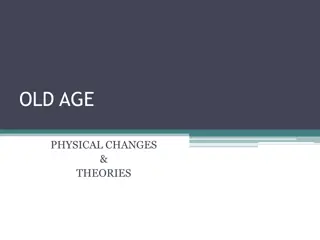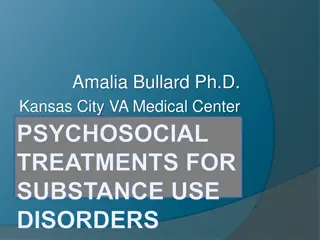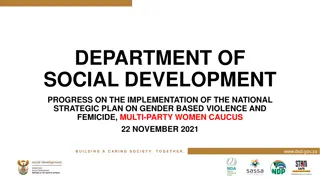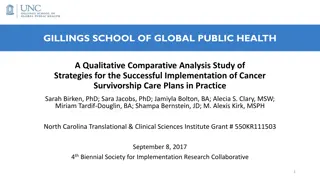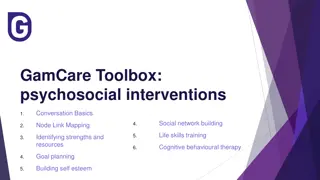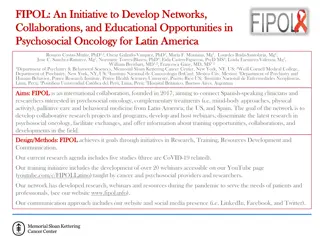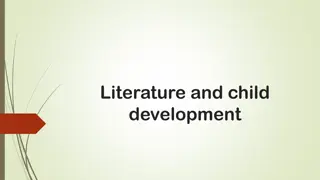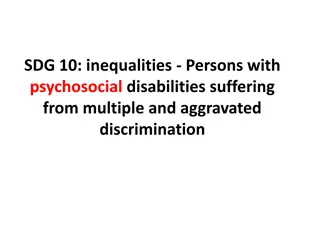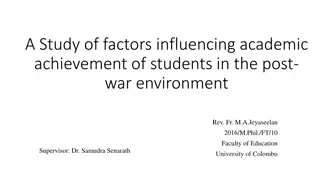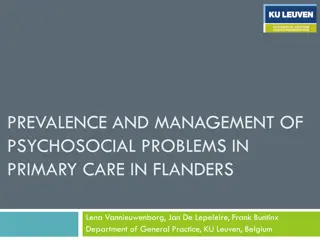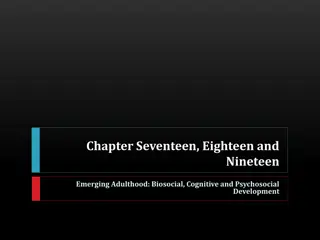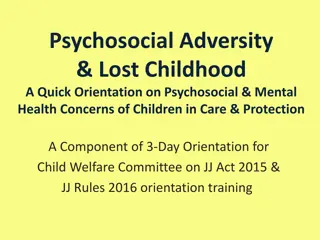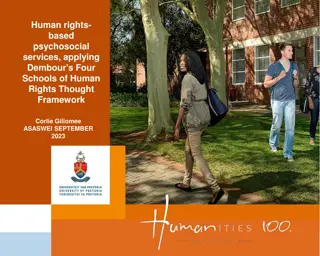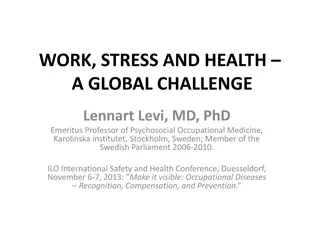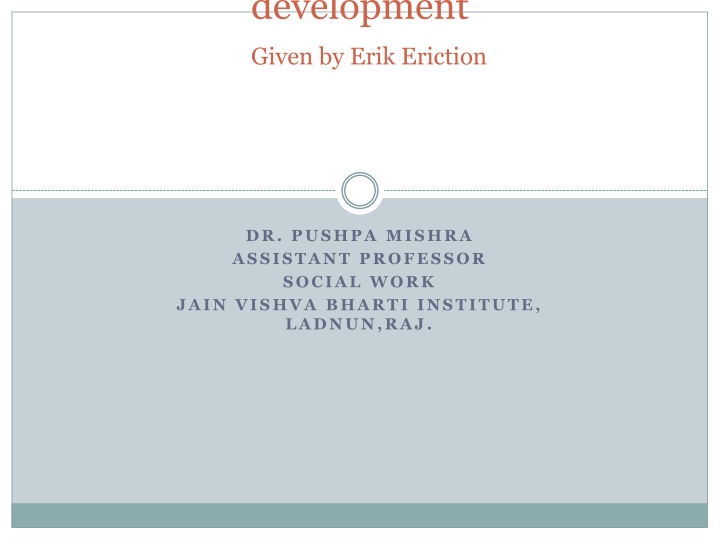
Psychosocial Development Theory and Erikson's Stages Explained
Understand the concept of psychosocial development through Erikson's theory, which describes how social experiences shape human development across eight stages, starting with Trust vs. Mistrust in infancy. Each stage presents a conflict that individuals must resolve to progress positively through life, culminating in Industry vs. Inferiority during childhood. Explore the impact of social interactions on psychological growth and the interplay between individuals and their social environment.
Download Presentation

Please find below an Image/Link to download the presentation.
The content on the website is provided AS IS for your information and personal use only. It may not be sold, licensed, or shared on other websites without obtaining consent from the author. If you encounter any issues during the download, it is possible that the publisher has removed the file from their server.
You are allowed to download the files provided on this website for personal or commercial use, subject to the condition that they are used lawfully. All files are the property of their respective owners.
The content on the website is provided AS IS for your information and personal use only. It may not be sold, licensed, or shared on other websites without obtaining consent from the author.
E N D
Presentation Transcript
development Given by Erik Eriction DR. PUSHPA MISHRA ASSISTANT PROFESSOR SOCIAL WORK JAIN VISHVA BHARTI INSTITUTE, LADNUN,RAJ.
What is psychosocial development This concept related to one s psychological development in interaction with social environment, involving psychological and social aspects of development of human Erison s theory describes the impact of social experience across the whole lifespan.
Cont.. There are eight stages in a lifespan arguing the development. They explain to his theory when conflicts rise people have the opportunity to grow or fall equly.
Psychosocial stage 1st Trust vs Mistrust -Birth to18 month In this theory around the infant s basic needs being met by the parents and this interaction leading to trust or mistrust. Trust is essential truthfulness of others as well as fundamental sense of one s own trustworthiness, virtue of hope, belief their need, understanding of the world and society, dependable affection, and good psychological health. Mistrust is permit self protection, unfriendly in society, disappointed, trouble development, close relationship, feeling of frustration, suspicion, withdraw full and lack of confidence .
Stage 2 autonomy vs shame--18 month to 3 years Child learn to feed themselves and do things on there own, develop a sense of autonomy and independence, toilet training Or they could start feeling ashamed and doubt their abilities, feeling of worthless, incompetence If we get the proper positive balance of autonomy and shame ,we will develop the virtue of will power or determination.
Stage 3 Initiative vs guilt 3to 5 year Using initiative in planning or caring out plans, positive attitude, personal accomplishment, aware 0f the various social and environmental role. Or develop a sense of guilt and do the misbehavior. A good balance leads to the psychosocial strengths of purpose.
Stage 4 Industry vs inferiority 5to 11 year Understand the rules imposed by school or home, cope with new social and academic demands. Or child can starts believing they are inferior, to other, failure result, incapable the facing the transitory adolescence. Parent must encourage, teacher must care and peers must accept.
Stage 5 Identity vs role confusion 12to 18 year Acquire a sense if identity. formation crisis (adolescence)who I am,peer relationship Or can become fused about their life. If it will successfully negotiated then they have virtue called fidelity.
Stage 6 Intimacy vs isolation 19to40 Intimate relationship with others. ability to trust others in a close and intimate. Or a sense of isolation develop instead. If it will successfully negotiate then it will instead carry virtue call love.
Stage 7 Generativity vs stagnation -40to 60years Comprise the productive years of adulthood, productivities, contributions to his family and society. Or preoccupied in stead with his personal needs, self absorption. But after the successful dealing, will have a capacity for caring.
Stage 8 Integrity and despair-- 60to till death Need to acceptance their life, accept their approaching, detached concern, prepare to accept death itself, developed wisdom, spiritual approach, or Major regrets, acceptance of imperfection, slow down productivity, life as a retired. If we see ourselves as leading a successful life then able to develop intigrity


